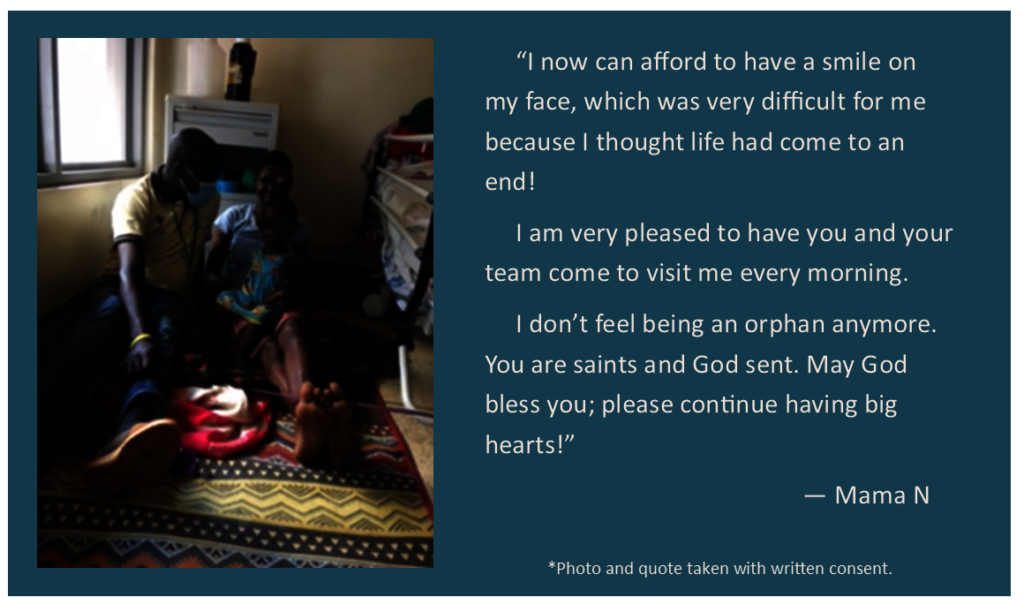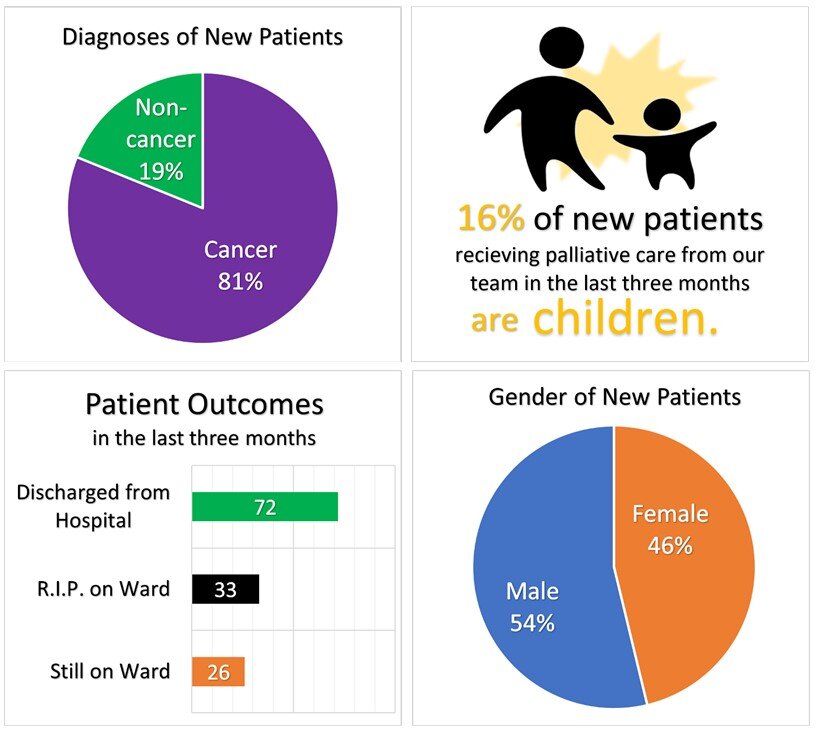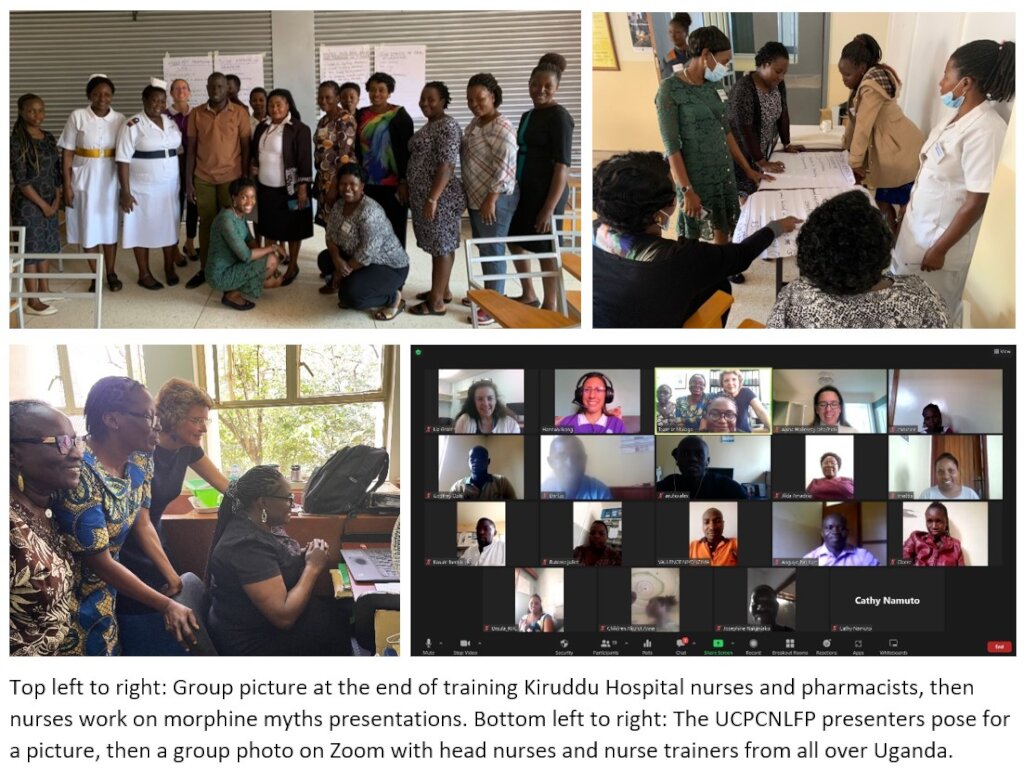By Julia Downing | Project Leader
There are just a few days remaining in 2022, which is often the time to stop and reflect on the year. We first want to say a big “thank you!” to our team, partners, and supporters in Uganda and around the globe. The year of 2022 has come with its own struggles from the COVID-19 pandemic and an Ebola outbreak in Kampala, with an Ebola Virus (EV) isolation centre in our Mulago Hospital. This year also has brought cherished memories in time spent with patients and their families, opportunities to educate and train others, and highlights in network and mutual learning through conferences. We hope you enjoy our updates over the last few months (September to November) below.
Patient highlight: Mama “N” – Seeing hope and life again.
This is a short testimonial from patient N who has benefited from our palliative care services. Our services to patients and their families are holistic (providing physical, psychosocial, emotional, and spiritual support) and are free of charge to patients, thanks to your support. All quotations and pictures are taken with written consent; see bottom of report for photo of patient with social worker Toko.
“I didn’t know what to do. I felt lost. I felt betrayed and hopeless. I just wanted to die.” These are the words from Patient N, or Mama N, who is 37-year-old female admitted in Mulago Hospital with a cancer of the eye. Mama N comes from Karamoja region, a very remote area of northeast Uganda, so she was far from the support of friends and family. Tragically, she was neglected by her husband and family after they were told about her cancer diagnosis and long hospital stay.
Although she was a patient herself, Mama N was left to take care of her three children alone. They soon struggled to have enough to eat; often they would have one meal a day, and sometimes they would just have to do with the hospital porridge. They tried to take care of themselves, needing items like soap or more clothes, but their little finances were drained to pay for the needed investigations and medications. To make matters worse, Mama N and the children had a communication barrier: the health care workers could not speak her language and it was difficult to find a translator.
Then situation got worse. As she started her chemotherapy treatments, the doctors told her that she could no longer breastfeed her infant. Mama N would need to buy milk for her baby, but with barely enough money for meals or soap, it seemed impossible.
Enter in our palliative care unit: when we met Mama N, we immediately started a holistic approach. This included supporting the clinical (medical) needs, and through our volunteer social workers, providing money through the comfort fund and giving psychosocial and emotional support. The team helped Mama N in navigating the Uganda Cancer Institute as well as ensuring translation support for her to communicate with medical staff. Mama N and her children are not neglected anymore but are visited often and supported by the team.
“I now can afford to have a smile on my face,” she told us, “Which was very difficult for me because I thought life had come to an end … May God bless you; please continue having big hearts!” And as a team, we are grateful for the financial support from everyone at GlobalGiving, as it allows us to support patients and families like Mama N and her three children, who are vulnerable and in great need.
Clinical care and relationships
We take pride in knowing our patient and families’ names and building a relationship with them during their hospitalisation and beyond. Patients are not numbers or medical conditions to us, but we want to share with you some data so you can understand our clinical care in the hospital wards.
In the three months of September, October, and November our clinical team including social worker volunteers visited our patients 965 times. We also contacted them by phone, with 664 calls in this time. Phone calls are especially needed to provide consultation and consoling for patients who are discharged, or to provide grief and bereavement support to the families of patients who have died.
We are grateful for your continued support to provide airtime for making calls or monies to support the patients in small ways (patient comfort fund for food, soap, or small toys).
Patient demographics
We have cared for 130 patients in both Mulago and Kiruddu Hospitals. While 24 of the patients were previously admitted, we registered 106 new patients in the last three months.
We provide continued care for the patients and their families during and after their hospital stay. Whenever possible, when a patient is discharged, we also connect the patient and their family to another palliative care service in their home area. We are happy to note that with our assistance, more than half of patients were able to have their pain and other symptoms managed and thus be discharged from the hospital. We are also honoured to work with the 33 patients and their families where the patient died (R.I.P. on Ward) for holistic care continues in the end of life and grieving process.
Please look at the bottom of this report for charts or graphics about the patients we serve.
Educational activities
Our palliative care unit is experienced in the training and mentoring of other health care workers. From clinical clerkships with postgraduate doctors at our partner Makerere University to training social workers on bereavement support, our mission is to promote excellent and accessible palliative care services for all.
In the last three months, we trained both on the ward (clinical, hands-on practice) and through presentations and organised training sessions. We had many medical students from Makerere University, including 74 undergraduates, 2 postgraduates in Internal Medicine and 3 postgraduates in Family Medicine. Likewise, we hosted 32 undergraduate medical doctors from Islamic University In Uganda (IUIU) on the hospital ward and for clinical teaching sessions. We also worked with two intern doctors at Mulago Hospital, as they did a rotation in palliative care.
Our team hosted a palliative care course for 11 nurses and pharmacists at Kiruddu Hospital in person, on September 15-16, which was sponsored by partner Cairdeas IPCT. Then, during October 24-26 we started UCPCNLFP, that is, Uganda Children’s Palliative Care Nurses Leadership Fellowship Programme. The UCPCNLFP was attended virtually by 16 Uganda head nurses and nurse trainers from 6 districts in Uganda and is being run in conjunction with the International Children’s Palliative Care Network (ICPCN) and the University of Edinburgh and funded by the Burdett Trust for Nursing. The second virtual session for UCPCNLFP happened on December 9-10.
Both trainings covered foundational topics such as what is palliative care and pain and symptom assessment, which includes assessment and addressing other non-clinical needs: emotional, mental, psychosocial, and spiritual. Training then branched to the complexities to managing pain and symptoms, communication and breaking bad news, and navigating the end of life and bereavement support. Please see the bottom of the report for pictures from the trainings.
Research and Conference activities
We were honoured to participate the virtual East Central and Southern Africa College of Physicians (ECSACOP) conference on September 24-26. This was the 7th annual ESCACOP conference with the theme of “Tackling the burden of communicable and noncommunicable diseases in Africa in the era of expanding digital health technologies.” Our contribution includes the following presentation: “Exploring the needs of people living with chronic disease among the refugee and host communities of Obongi district and Adjumani districts in Northern Uganda,” by Dr Elizabeth.
Other educational activities included participating in the Africa ECHO sessions, the World Cancer Congress in Geneva, and the University of Edinburgh webinars on Advancing the role of higher education institutions (HEIs) to support palliative care education in lower- and middle-income countries (LMICs).
We hope you have enjoyed our update! If you have any questions or feedback, please do email us at info.pcerc@gmail.com. And as the year draws to an end, please join us in reflection of the months past and in anticipation of better days to come.
Well wishes and happy holidays,
PcERC team.
Project reports on GlobalGiving are posted directly to globalgiving.org by Project Leaders as they are completed, generally every 3-4 months. To protect the integrity of these documents, GlobalGiving does not alter them; therefore you may find some language or formatting issues.
If you donate to this project or have donated to this project, you can receive an email when this project posts a report. You can also subscribe for reports without donating.


